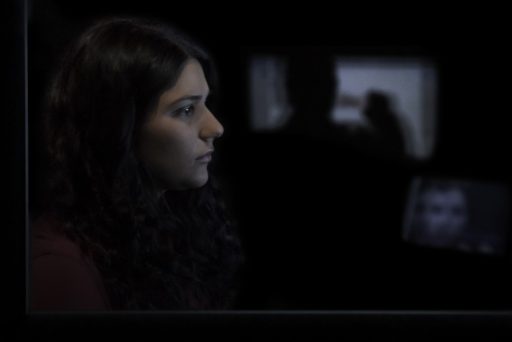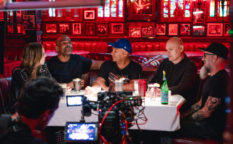Review: The Viewing Booth (2019)

“How, in your opinion, are we to prevent war?”, a London lawyer once asked British author Virginia Woolf during the height of the Spanish Civil War. She suggested observing images of war published every week. “Let’s see,” she wrote, “whether when we look at the same photographs, we feel the same things.”
Israeli director Ra’anan Alexandrowicz obviously sees some personal truth in this opening quote. The power of the image and the truth we as individuals find or reject in it, is what has driven him to repeatedly revisit the occupation of the West Bank in his films The Law in These Parts (2001) or The Inner Tour (2001). The Viewing Booth unveils at the outset the thought process of a man, who feels that by providing the necessary information and footage, he can educate the people. The movie that unravels, however, is a strong example of how none of this might be true. That we create our own meanings for nonfiction images, depending on how they relate to our belief systems.
The movie is a bare-bones documentary set almost entirely in the dimly lit name-giving booth. Several Israel-interested students at an American university will take a seat in it. Alexandrowicz will show them video clips about the occupation. Some of them by the Human Rights Organization B’Tselem, others by conservative political channels and the Israeli army. One of these viewers will be a young Jewish-American girl named Maia Levy. And she is the one that the movie is about. Because in her, Alexandrowicz has found what he has been aiming at with his movies. Strong pro-Israel individuals, who believe in the impeccability of the settlers and the army in the West Bank. To whom Palestinians are foremost terrorists.
How do we deal with images, that go against our individual perception of the world? Do we always evaluate information with a directional bias toward reinforcing pre-existing views? Maia has come in contact with B’Tselem before and has even watched some of their videos. Her mother, she says, deems them as lies. She herself perceives them as informative but to be taken with a grain of salt. This is consequently also Maia’s story, her journey from curiosity to the bitter rejection of the seen image.
The rules are simple, to begin with. She is free to choose any video and the duration of the viewing but should pause at any moment to express her feelings and thoughts. Half a year later, she will return, not only to rewatch the clips but also herself commenting on them. The small camera, that Alexandrowicz has set up facing her, is not only the viewer’s but also his eye into the emotions and thoughts that run through her mind and across her face.
Her close-up, the centerpiece of the movie, is an open book of disbelief, irritation, emotional confusion or outright rejection. Paired with the verbal observations of the images in front of her, this austere setup becomes an unembellished gaze into constructed and defied realities. A new media age and indoctrination master class, the movie oscillated between unwanted hilarity and shocking bewilderment.
“This is one of those fake videos”, she comments irked, as a B’Tselem video shows a boy being kicked by a soldier. A nightly search of a Palestinian family home by a masked group of soldiers and the mother’s trembling responses to the question result in an apathetic “Don’t trust her, they lie a lot”. The young woman’s eyes harden as she watches the physical abuse on screen, the faintest emotional panic fading over its finer lines. Alexandrowicz keeps cutting between these reactions and some of the actual footage, creating an interesting catch for the audience. Her observations, which the viewer often is often forced to rely on, may not mash with what he experiences once the narrative switches to the video. Truths are challenged, perceptions are laid open.
“Weird” is Maia’s go-to catchphrase whenever physical aggression catches her off-guard. Looking for discrepancies, or “lies” as she calls them, becomes her default reaction to challenges of her world view. Repeatedly she complains about not being given context about the setup. “It makes them look bad”, she grumbles, as if abuse could rectify itself. The main issue, however, is not happening on the screen. “The filming of it is more happening to you than the actual moment”, Alexandrowicz observes during their second session. Maia’s last glimmer of hope in categorizing these images is to fully reject their documentation in the first place.
Her defensive processing is most prominently exposed in a short segment of young Jewish settler boys throwing sticks and stones at the window of a Palestinian apartment while the nearby soldiers pretend not to notice. Upon seeing the situation unfold in the video, she assumes “They look like Arab kids, I don’t think Israelis would do this”. After being told that these are indeed Israelis, she proceeds with an uneasy “It’s hard to tell”. While the soldiers not interfering in the conflict is not okay by her standards, once again her processing of the scene reverts back to the old “Then again, we don’t know what they [Palestinians] did”.
Maia succumbs to a backfire effect, taking unwelcome information not as a challenge of her world view, but instead using it to support her original opinion even more strongly. But the truly demoralizing revelation unfolds, that she herself admits to this. With the Israeli behavior going against her belief system, it leads her, in her own words, to “not wanting to believe it and picking up evidence through things done wrong”. In another mind-blowing moment, she draws parallels between the footage and mass media Reality TV, quoting “Real Housewives” and “Jersey Shore” as kindred spirits.
These unfiltered personal truths flowing from Maia’s stream of consciousness are what gives this project its edge. The director, himself like all Israelis a former soldier with personal experiences about events that Maia only knows from TV, keeps himself aloof for most of the runtime, only occasionally providing further information. This is not a run-of-the-mill political debate unfolding between the two. It’s an effort to answer the question of why humans often can’t create change or find common ground. Why our realities are drifting further apart. Only in some rare moments, Alexandrowicz offers some personal input, leaving not only Maia speechless but also catching the viewer off-guard with new perspectives.
In the end, it is about a simple truth. About one’s personal identity. “There is still something there that can’t reach you”, Alexandrowicz capitulates at some point. Her inability to acknowledging corrective truths makes him question himself and his work. “It is not convincing enough”, is what Maia can ultimately muster. Alexandrowicz may have set out to make a film about the Israeli-Palestinian conflict. What he found, however, was a disheartening prime example of personalized truths.
The Viewing Booth had its world premiere in the Forum section of the Berlinale on February 21st.
Written and directed by: Ra’anan Alexandrowicz
Cinematography: Zachery Reese
Editing: Neta Dvorkis, Ra’anan Alexandrowicz
Sound: Design:Rotem Dror
Producers: Ra’anan Alexandrowicz, Liran Atzmor
Executive Producers: Annie Roney, Kirsten Johnson, Susan Norget
















